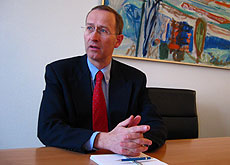Ministers launch Schengen/Dublin campaign

The government has called on the population to support the European Union Schengen/Dublin accords – eight weeks before a nationwide vote on the issue.
Ministers argued that the treaties would result in better security, a tighter grip on asylum as well as many economic benefits.
Four cabinet members launched the campaign in favour of the Schengen/Dublin treaties on closer security and asylum cooperation at a news conference on Thursday.
Economics Minister Joseph Deiss was joined by Foreign Minister Micheline Calmy-Rey, Justice Minister Christoph Blocher and Finance Minister Hans-Rudolf Merz.
Deiss said their presence at the launch was a “sign of our conviction as a government and our unity”.
Schengen/Dublin forms part of a second set of bilateral accords with the EU, which were approved by parliament in December.
But Swiss voters will have the last word, after opponents – led by the rightwing Swiss People’s Party – collected enough signatures to force a nationwide vote on June 5.
Deiss said that the government was convinced that the accords would increase security at Swiss borders and benefit the economy and tourism.
Guarded
However, Blocher – a leading light of the People’s Party and whose personal opposition to the accords is known – was more guarded. He said that security and the asylum situation would improve “if the system works”.
Merz added that Swiss borders were a “special case” in Schengen, as Swiss frontier guards would still be responsible for border control. Swiss banking secrecy would not be threatened, he said.
For her part, Calmy-Rey said that the accords should in no way be seen as a back-door entry into the EU and that they would not undermine Switzerland’s sovereignty.
The four ministers were accompanied by Markus Notter, president of the cantonal conference of justice and police directors, who spoke on behalf of the cantons.
He emphasised that international cooperation in the fight against crime was more important than ever and that under Schengen it would improve. He also said that cantonal police jurisdiction would not be affected.
Flexible borders
People within participating Schengen countries can move into any other participating country without undergoing systematic checks. Participating countries will coordinate their external controls.
Dublin streamlines the application process for refugees seeking political asylum and aims to reduce the number of “orbiting” asylum seekers, who are shuttled from member state to member state.
The latest opinion poll on the vote, commissioned by the Swiss Broadcasting Corporation at the end of February, shows public support has dropped substantially since parliament came out in favour of Schengen/Dublin.
Just under a quarter of the electorate is against Switzerland’s participation, a rise from 12 per cent since the first survey last August.
But it found that 59 per cent of voters are in favour of the accords, with 18 per cent of respondents still undecided.
swissinfo with agencies
Schengen includes measures to lift border controls and improve cross-border security.
Dublin concerns asylum. In the EU, asylum seekers can file a request for asylum in one country only.

In compliance with the JTI standards
More: SWI swissinfo.ch certified by the Journalism Trust Initiative











You can find an overview of ongoing debates with our journalists here . Please join us!
If you want to start a conversation about a topic raised in this article or want to report factual errors, email us at english@swissinfo.ch.